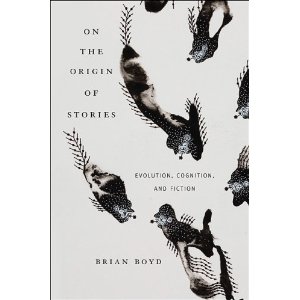Art as Play
5 april 2010 | In Books Self-indulgence | Comments?
”I suggest that we can view art as a kind of cognitive play, the set of activities designed to engage human attention through their appeal to our preference for inferentially rich and therefore patterned information”
Brian Boyd: On the Origin of Stories – Evolution, cognition, and fiction
I’ve written precisely one text about aesthetics, and used as a kind of motto this quote from Graham Greene’s (wonderful) novel Travels with my aunt: ”Sometimes I have an awful feeling that I am the only one left anywhere who finds any fun in life”. I’m reading Brian Boyd’s ”On the origin of stories” and the feeling is slowly subsiding.
Suddenly Susan
30 mars 2010 | In Books Meta-philosophy Psychology Self-indulgence | 2 Comments
First of all: I like Susan Blackmore. In fact, I met her once, at the first proper conference I ever attended (the ”Toward a Science of Consciousness” conference in Tuscon 2004 hosted by David ”madman at the helm” Chalmers). She came and sat next to me during the introductory speech and asked me what had just been said. I said I hadn’t payed that much attention, to be honest, but I seemed to remember a name being uttered. We then proceeded to reconstruct the message and ended up having a short, exciting discussion about sensory memory traces. From now on, I remember thinking (having to dig deeper than just in the sensory memory traces, which will all have evaporated by now), this is what life will be like from now on. It hasn’t, quite.
ANYWAY: So I like Susan Blackmore, but today, I’m using her to set an example.
I recently had occasion to read her very short introduction to consciousness in which she take us through the main issues and peccadilloes in and of consciousness research. One of the sections deals with change blindness and she describes one of the funniest experiments ever devised: The experimenter approach a pedestrian (this is at Cornell, for all of you looking to make a cheap point at a talk) and asks for directions. Then two assistants, dressing the part, walks between the experimenter and the pedestrian carrying a door. The experimenter grabs the back end of the door and wanders off, leaving the pedestrian facing one of the assistants instead. And here’s the thing: only 50% of the subjects notice the switch. The other 50% keeps on giving direction to the freshly arrived person, as if nothing has happened.
This is a wonderful illustration of change blindness, and it’s a great conversation piece. You can go ahead and use it to illustrate almost any point you like, but here comes the problem: there is a tendency to overstate the case, especially among philosophers (I’m very much prone to this sort of misuse myself), due to the fact that we usually don’t know, or don’t care much, about statistics. Blackmore ends the section in the following manner:
When people are asked whether they think they would detect such a change they are convinced that they would – but they are wrong.
We have a surprising effect: people don’t notice a change that should be apparent, and as a result you can catch people having faulty assumptions about their own abilities, and no greater fun is to be had anywhere in life. But Blackmore makes a mistake here: People would not be wrong. Only 50% of them would. It’s not even a case of ”odds are, they are wrong”.
I would use this as an example of some other cognitive bias – something to do with our tendency to remember only the exciting bit of a story and then run with it, perhaps – only I’m afraid of committing the same mistake myself.
(Btw: I also considered naming this post ”so Sue me”)
The Nightly Book Club reads Delillo
15 mars 2010 | In Books parenting | Comments?This book (point omega, by Don Delillo) will stand out in my memory for one reason in particular: it’s the first book we finished together. Over the last few nights, I’ve been trying to lull Benjamin (Young Sir) to sleep in his own bed, by reading it out loud to him. It hasn’t worked as intended, but for each day he becomes more contented just lying there, listening, smiling and waving when I raise my eyes from the page. Patently not bored. (We did a few nights of ”The House of Wits” to, but 693 pages read out loud means a long wait for closure, not suitable for infants).
Point Omega is very recognizably Delillo, with the questions without question marks and the penchant for situations when time slows down and something therefore becomes, you know, art, somehow. You pick a situation, at random or with great care, and you attend to it, as you might so easily not have done. Even when the events that unfurl are very dramatic indeed (the Kennedy-assassination, post 9/11 New York, disappearances and violence), what happens is almost never what matters. And he has a way with sentences.


What Modesty Forbids
31 januari 2010 | In Books Hedonism Self-indulgence | Comments?I’m sure every reader has his/her way of working her/his way through a book or paper with the help of a pen, underlining and making notes in the margin. The ”notes in the margin”, for me, has settled on a quite restricted number of expressions. There’s ”qb”, of course, for ”question begging”, there is the exclamation mark (which I hardly ever use otherwise) for remarkable statements, there are shorthands for missing premisses, spurious reasonings. and so on. There is the occasional ”good point”, when something strikes me as being just that. And the ”Exactly”, when someone makes a good point with which I agree. Finally, the ”Exactly. Damn it”, when the point is good, I agree, and it is so essential to my own argument that I curse the fact that someone else got to publish it first. (These things tend to happen when your views are true and interesting.)
This happened to me constantly while reading Leonard D Katz’ absolutely superb dissertation ”Hedonism as metaphysics of mind and value” (and yes, my title is a bit of a hommage). In fact, I might as well have put a sticker with ”Exactly. Damn it” on the cover. (His practically book-length on pleasure in the Stanford Encyclopedia of Philosophy is simply amazing, without doubt the best piece of philosophical writing there is on the subject, and the fact that things still get written about pleasure without reference to either of those two texts is nothing short of a scandal. (Stop it David, you are getting all worked up and excited, and that’s a shame).)
And now it happened again, in the work of Sharon A Hewitt. The most striking resemblance of my view and hers is our claim that goodness and badness are basically phenomenal properties: the experiences of pleasure and displeasure. ”Feeling good” is, in fact precisely that: having that feeling which goodness consists in. I would like to praise her work, because it is really quite brilliant, but it seems to me that modesty forbids it. We have not been in contact while working on our respective dissertations, so either there is a common source (and Katz’ work might very well be it. That, or C.I. Lewis’ ”An analysis of knowledge and valuation”), or we have some sort of snail-telegraph thing going.
Stop reading, start writing
9 januari 2010 | In BBC Books Meta-philosophy Self-indulgence | Comments?My first all too serious philosophical essay was on Heidegger (well, actually, I did a number on the ”positionality” concept in the work of Sartre earlier still, but it would take an insane amount of scholarly obsession for anyone to ever dig that up). The nicest thing said about was that it is ”not as incomprehensible as these things usually are”. The literature I discussed, I found at the University Library, actually going through a number of philosophy journals. I had a computer at the time, which was just barely hooked up to the internet, but didn’t use it for literature searches, just for writing and the occasional email. I spent a lot of time thinking about the subject of my essay, and used a very limited amount of sources.
A year or so later, while working on a different essay, I discovered JSTOR, and for about a month and a half, the printer didn’t get a rest. It suddenly dawned on me that everything interesting had been written about, at length, from almost every perspective, and the goal to find a theoretical position that was not currently occupied, and then to occupy it, suddenly struck me as much more difficult than I’d imagined. I spent the next few years reading more, too much probably, and thinking and writing less.
I used to do all my best thinking during walks and while running (or derogatorily: ”jogging”). Usually in very dull environments, not to distract from the thinking. Then I got an iPod, and started to listen to lectures, podcasts and audiobooks during those walks and runnings. (iTunes university has some great stuff, the podcasts from Nature, and from TED and the RSA are excellent. BBC 4’s ”thinking allowed” and ”in our time” just have me in stitches). And instead of thinking about what I’ve just heard, I tended to listen to another lecture, podcast or audiobook. Similarly with papers, even books. Before I start working on this chapter, I argued, I just need to read this paper, or that book. One wouldn’t like to be caught out ignorant, now, would one? No, one would not.
The all too great availability of other people’s writing and thinking made me quite heavy on the consumer side of science and philosophy, and much less of a producer. It is, of course, a great thing to learn, and to listen, but in order to become a philosopher, it is necessary to start doing it for yourself. To actually not care, for a bit, whether someone has written that same thing before, and been more well read while doing so.
My dissertation took longer than it should have, and I know people who have been, and still are, in that state where they just can’t seem to finish their texts. Partly, I believe, for this reason. They are excellent, well-read consumers and thoughtful, accomplished critics, but seems almost to have forgotten how to actually do philosophy. (The dominance of ”critical” philosophy among published articles is a testament that this tendency is very common indeed). The kind of second-order thinking were you are constantly reflecting on how what you are writing relates to what other people have written tends to stand in the way of confident, genuinely original and interesting work. At some point, you just have to get out of reading mode, and enter writing mode.
Bored by Happiness?
29 september 2009 | In Books Happiness research Hedonism | 1 CommentI write occasionally on this blog called ”the Happiness Blog” (in swedish), which is mostly about psychological, behavioral and political strategies to increase happiness. It’s a fairly honourable pursuit, and the research it is based on is fascinating both in its robust results and in the large areas of it that are still very much up for discussion.
Recently, however, I’ve noticed a lot of reactions to this research that is, well, bored by the whole thing. This is not too surprising, the new wave of books that made it a trend culminated, I’d say, in 2005, and it was bound to get old sooner or later. This autumn will see a surge of books on the subject written in swedish, so we might expect even more of these reactions. The stuff is still highly relevant, of course, eternally so, but there is a bit of a PR problem here. We need to move on from the basics, perhaps even construe some disagreements about different happiness-researchers so that the reaction against a certain view on how happiness should be promoted turns into an argument for an alternative view. (People do this in literary criticism All The Time.)
A big problem, (as I’ve noticed in the mixed reception of my own vain attempts for media attention), is that the criticism vastly underestimate the complexity of the happiness researchers claims. While I’m actually quite pleased that books with some scientific credentials is budding in on the self-help market, it also opens up for poorly researched self-help books to dress up as science. While happiness-reserachers, often believe that even poorly reasoned self-help books might do more benefit than harm, its important to keep a certain distance. At least if we want the coverage, and the discussion, to become more nuanced and the full complexity of the research be allowed to surface.
Confession
21 september 2009 | In Books | Comments?In one of David Lodge’s campus novels (”as opposed to what?” I hear you say. ”His social-realistic stories set in the rural south? They’re all campus novels”. Fair point) we come across the parlour game ”Humiliation” . Each participiant writes down the name of a book he or she hasn’t read. The winner, in a purely technical sense, is the participant whose choosen book has been read by the largest number of participiants (Hint: writing down ”the Da Vinci Code” doesn’t work half as often as you might think. It neither wins you the game, nor endears you to your friends). The name of the game, I take it, is fairly self-explanatory. In the novel (”Nice work”, it might have been. Or ”Small world”), a professor of english literature, desperate to win, owns up to not having read ”Hamlet” and is subsequently fired from his position.
Anyway, I’m just about to loose my winning entry for this game. I’m finally reading ”Three men in a boat”. The fact that I haven’t read it already is not so much humiliating, perhaps, as inexplicable. Not only is it the hands down, drop dead funniest book I’ve ever read, it is also, arguably, the source of everything that have been funny every since. Literary slap-stick at its best, and a grand festival of non-sequiturs. It is also an excellent display of that celebrated, scorned and recently hotly debated comic device: the cutaway joke. Done well, as it is in ”three men”, it doesn’t bring the story to a screetching halt, or it does, but you don’t mind. The point is that what’s beside the point (or beside the plot, anyway), just is the point.
